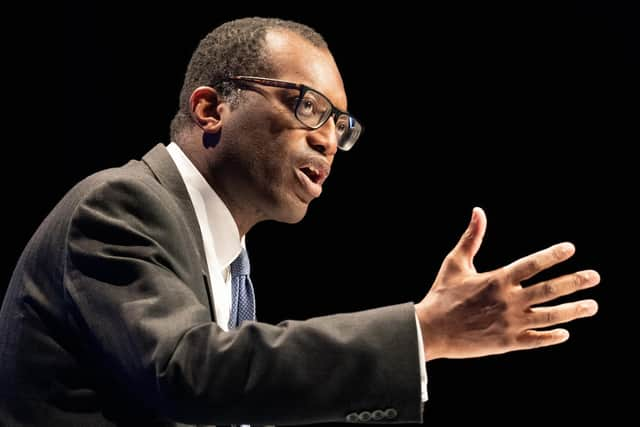Kwasi Kwarteng acknowledges turbulence after mini-budget insisting “our position hasn’t changed”
Both Mr Kwarteng and Downing Street insisted there were no plans for further changes to the package but the financial markets appear to be expecting moves to ditch some of the tax cuts in order to demonstrate a commitment to balancing the books.
Reports suggested talks are under way between No 10 and the Treasury on abandoning other elements of the £43 billion tax-cutting plan, including the commitment to axe a planned increase in corporation tax.
Advertisement
Hide AdAdvertisement
Hide AdMr Kwarteng, in Washington for the International Monetary Fund’s annual meeting, was repeatedly asked about the prospect of a U-turn.


Mr Kwarteng has acknowledged the UK suffered some “turbulence” following his mini-budget but said the economy was facing the same problems as other countries around the world.
“What I am going to acknowledge is the fact that it is a very dicey situation globally,” he said in a pooled clip for broadcasters in Washington.
Pressed on the situation in the UK, he said: “There was turbulence.
“Everybody is focused on inflation, everybody is affected by potential interest rate rises, everybody is affected by the energy price spike which has been exacerbated by Putin’s illegal war in Ukraine.
“Everybody across the global financial community is focusing on the same problem.”
He insisted “our position hasn’t changed”, adding: “I will come up with the medium-term fiscal plan on October 31, as I said earlier in the week, and there will be more detail then.”
Asked if a corporation tax U-turn was on the cards, he said: “What I’m totally focused on is delivering on the mini-budget.”
Advertisement
Hide AdAdvertisement
Hide AdHe added: “I speak to No 10, I speak to the Prime Minister all the time.
“We are totally focused on delivering the growth plan.
“What we were facing was a tax high of 70 years and no growth.”
He said his talks with the International Monetary Fund had illustrated that “growth is a central focus of the international community” and the Government was “quite right to focus on growth”.
“People are talking about some of the ideas that we have put forward,” Mr Kwarteng said.
With Ms Truss’s leadership already being questioned after little more than a month in the job, Foreign Secretary James Cleverly said a change at the top of the party would be a “disastrously bad idea”.
Downing Street insisted there were no plans for further changes to the mini-budget package but the financial markets appear to be expecting further moves to ditch elements of the Chancellor’s tax-cutting plans in order to demonstrate a commitment to balancing the books.
The mini-budget’s plan to increase borrowing to fund tax cuts caused turmoil on the financial markets, which sent Tory poll ratings plummeting and eventually led to Mr Kwarteng abandoning plans to scrap the 45p rate of income tax for top earners.
The managing director of the International Monetary Fund (IMF) said it is sometimes right for a “recalibration” of policies.
Advertisement
Hide AdAdvertisement
Hide AdSpeaking at a press conference in Washington, Kristalina Georgieva said: “Our message to everybody, not just the UK, is that at this time, fiscal policy should not undermine monetary policy.”
She added that “it is correct to be led by the evidence, so if the evidence is that there has to be a recalibration, it’s right for governments to do so”.
Ms Georgieva also confirmed IMF leaders have had a “constructive” meeting with Mr Kwarteng after the institution’s chief economist said the UK Government’s tax cuts threatened to cause “problems” for the British economy.
The scale of the backlash to the mini-budget has led to speculation that the Prime Minister’s position could be in jeopardy.
At a stormy meeting of the backbench 1922 Committee in Westminster on Wednesday, Commons Education Committee chairman Robert Halfon told Ms Truss she had “trashed the last 10 years of workers’ Conservatism”.
Meanwhile, the editor of the influential ConservativeHome website, Paul Goodman, suggested there has been speculation about replacing Ms Truss with a joint ticket involving her former leadership rivals Rishi Sunak and Penny Mordaunt.
But Mr Cleverly told BBC Radio 4’s Today programme: “We have got to recognise that we do need to bring certainty to the markets.
“I think changing the leadership would be a disastrously bad idea politically and also economically.
Advertisement
Hide AdAdvertisement
Hide Ad“We are absolutely going to stay focused on growing the economy.”
Mr Cleverly declined to rule out further U-turns on the mini-budget – while insisting the Government will “absolutely stick” with its tax-cutting principles – but the Prime Minister’s official spokesman made clear there will be no further changes.
“The position has not changed,” the spokesman said.
If changes are made, economists and Tory MPs think the reinstatement of the previously-planned increase in corporation tax from next April may be the most likely move.
But Mr Cleverly told Sky News: “I think that it is absolutely right that we want to invest in businesses. It is absolutely right that we help them stay competitive, we help them stay afloat.
“We have got to make sure we can compete internationally with the other places businesses can choose to locate. We have got to make sure we are tax-competitive.”
Asked if the Government will stick with the policies of the mini-budget, he said the “bulk” of the mini-budget was the package to protect households and businesses from soaring energy costs.
But it was also “about making sure that taxes for 30 million people were reduced a little bit and those are really strong principles” and “I think we should absolutely stick with those”.
He said the planned statement by the Chancellor on October 31 will set out a more “holistic” view of the Government’s plans, but the “foundations” of the mini-budget were “really key for the growth agenda the Prime Minister has put forward”.